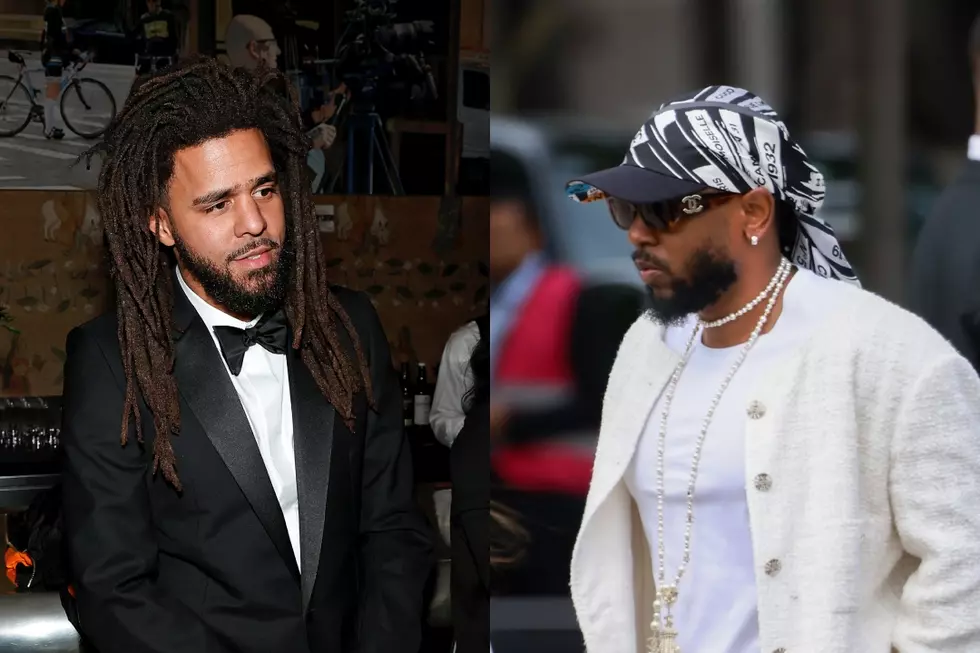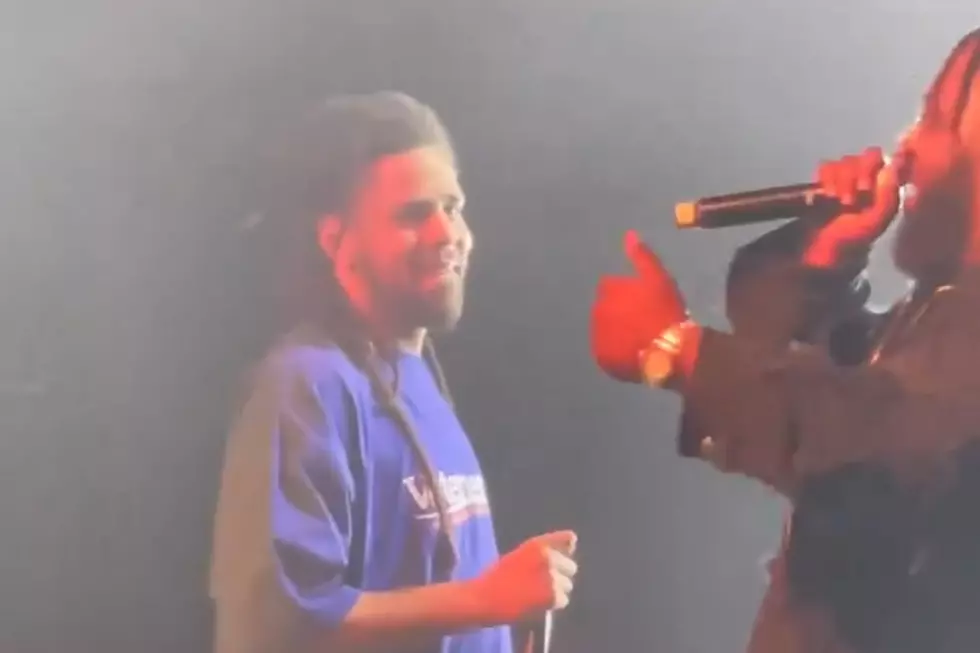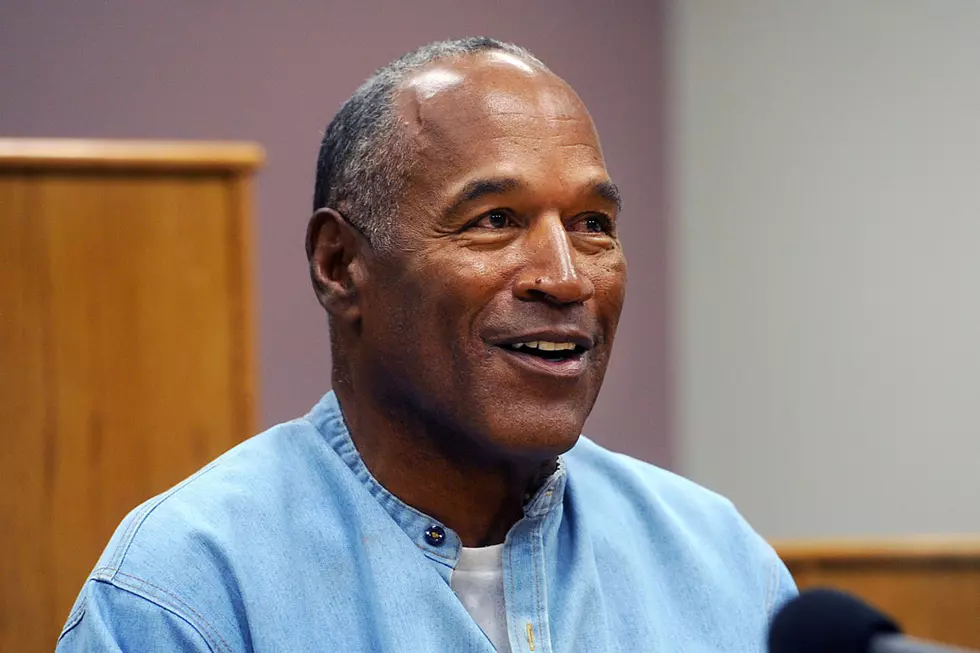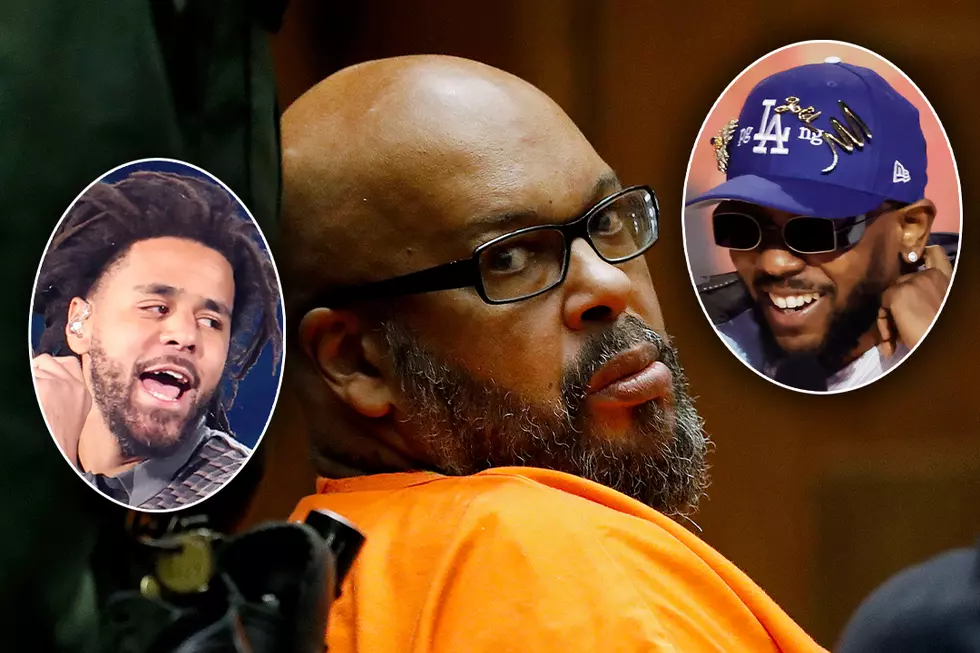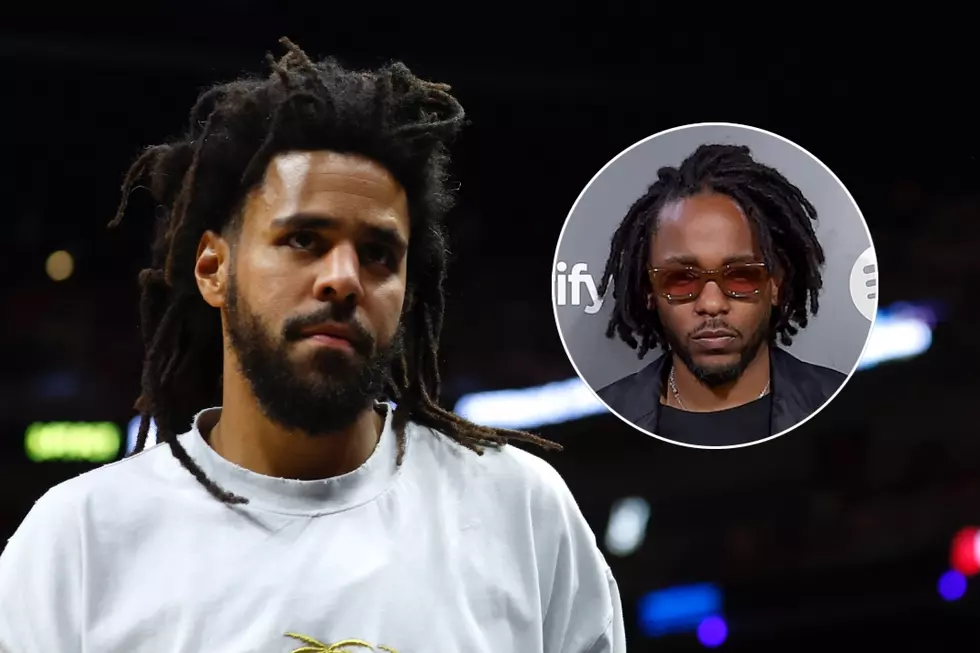![J. Cole: Dreamin’ [Full Story from the October 2011 Issue]](http://townsquare.media/site/812/files/2011/09/JCole2_415.jpg?w=980&q=75)
J. Cole: Dreamin’ [Full Story from the October 2011 Issue]
"I'm mad nervous," J. Cole says to a packed room at Roc the Mic Studios, in Manhatta's Chelsea neighborhood. “This is crazy.” His anxiety is understandable. It’s mid-August, and the 26-year-old is about to press play on his debut album, Cole World: The Sideline Story, for a full room of critics for the first time. The album itself has been more than two years in the making, but the stories it tells go back much further.
An Army brat, Jermaine Cole was born in Germany but soon moved with his family to Fayetteville, North Carolina, a moderately sized city best known for its military base, Fort Bragg. Born to a White mother and Black father, Cole was raised by his mother after his parents split when he was young.
After starting to rap in high school, Cole set his eyes on New York City, hoping to land a recording contract. An academic scholarship to St. John’s University brought him to the Big Apple, and he became the first artist signed to Jay-Z’s emerging Roc Nation label, in February 2009. Cole released the critically acclaimed mixtape The Warm Up in June of that year and was featured on Jay’s Blueprint 3 that September. Last year, another mixtape, Friday Night Lights, hit the Net, quickly becoming a worldwide trending topic on Twitter and earning similar praise as The Warm Up did.
Now, after much delay and plenty of hype, J. Cole is ready to release his official debut. An hour or so before the listening session, he sat down for a conversation with XXL.—Adam Fleischer
XXL: What do you want people to get from your debut album?
J. Cole: I want them to see the growth. You’ll see that you get flashes of the mixtapes—The Warm Up, Friday Night Lights. But then you also got spots where you’re like, “Oh, my God. What the fuck is this?” I didn’t plan on being a mixtape artist my entire life. Of course, I want them to soak up the stories and the songs, but if there’s one thing I want them to get from it, it’s that, “Yo, this nigga’s not fuckin’ around. He’s not settling for that status.”
How are you able to express that same mentality that you had on the earlier mixtapes, that same hunger that was there, now that you’ve had success?
As much as it might look like, to someone else, that I’m successful, I never feel like I’m anywhere. The further I go, I still feel equally further from my eventual goal. Because as I grow, I get more goals. I’m never content.
It seems like a lot of young artists these days—and maybe it’s because mixtapes are like albums—their debut albums are more about having made it than trying to make it.
I had to fight not making my first album sound like that. Because I’m in two different places. I’m hanging around these types of people sometimes, and I’m seeing these types of things, and I had to make it a point to not talk about that too much. It’s weird. I want to stay true to these topics on the first album and tell that story, without telling too much of, “I’m making money now.” I could have made that album. Exaggerated all that shit.
How much money I’m getting and all the places I go. But it’s the first album. I still feel like this is an important story to tell for my career.
FOR MORE J. COLE, GO TO PAGE 2
You talk about “the ’Ville,” Fayetteville, a lot in your music. How big a city is your hometown?
[About] 250,000 people. There’s no skyscrapers or anything close to that, but it’s not a small town. It’s not, like,
one school, no stoplights.
And it’s a military base?
Yeah, there’s a military base attached right on the outside of the city.
What’s the racial makeup?
I think it’s pretty even. Because of the military, there’s a wide variety of people. Growing up, it seemed split down the middle.
Your mom is White and your dad is Black. How did you deal with—how are you still dealing with—your racial identity?
You know what it is? My mother was White, but to me, I never looked at her like that. I would only become aware of that when we were in public or when she would pick me up from school. I would be like, Oh, man, everybody gonna see my mom is White. I know I’m about to get clowned. You would get clowned on in fourth or fifth grade. I used to get Michael Jackson jokes: “You don’t know if you Black or White.” That was the only time I’d be aware. Not that my mother was acting Black, ’cause she wasn’t, but she’s just my mom.
I can identify with White people, because I know my mother, her side of the family, who I love. I’ve had White friends. I know people from high school that I might not have hung out with outside of high school, but I think I got to know them pretty well, so I know they sense of humor. But at the end of the day, I never felt White. I don’t know what that feels like. I can identify. But never have I felt like I’m one of them. Not that I wanted to, or tried to, but it just was what it was. I identify more with what I look like, because that’s how I got treated. Not necessarily in a negative way. But when you get pulled over by the police, I can’t pull out my half-White card. Or if I just meet you on the street, you’re not gonna be like, This guy seems half-White.
Do you see your other side of the family much?
When I was younger, I spent a couple summers with my pops, got to see that side of the family.
Do you have a relationship with him?
I got a great relationship with my father. I always had a relationship with my father. But it was never—I don’t know how to describe it to you. I never questioned it until I got older. That’s when I started to be like, Wait a minute. Yeah, I know him. He paid child support, $400 a month, forever, so I know him. I talk to him on the phone. I spent summers with him. But the question that just hit me, like, Yo, I don’t really know this man. Almost like I stopped lying to myself. But I applaud him and respect him for even checking in, even if it was once every three months, once every four months, birthdays. That’s dope. A lot of fathers don’t even do that. And it’s dope because I know mad people probably relate to [these issues], even on a deeper level than me. Maybe they have no relationship.
Was it a certain thing that brought you to that revelation, or was it just getting older?
I say this with the fact that I really do respect my pops—and as I’m getting older, the relationship is getting better. That’s the best part. As I’m getting older now, and becoming a man, now we’re actually getting to know each other. He didn’t know my likes. We used to have conversations. When it was getting close to graduation time from school, he’d be like, “Man, what you gonna do?” I might say something about music, or maybe I won’t. If I say something about music, his response would be like, “Man...” He just doesn’t get it. He doesn’t know me well enough to be like, “Make that shit happen,” like a father that knows you would say. It happened around graduation time of college. I was like, “Hold up, man. I don’t really know you like that.” Now it’s more honest conversation because I’ve already been honest with myself. But there’s way worse cases than mine. I don’t want to sound like I’m complaining. There’s way worse shit than... There’s people that don’t know they fathers or know they mothers.
Your mom is such a presence in your music, and your love for her really shows. How much are you able to see her and your brother?
Not much. Hopefully… That’s the whole reason I’m doing this. So that shit’ll change. My real dream is to have a whole, like, buy a whole piece of land. Imagine, like, a long driveway. Like, a cul de sac–type street, with maybe, like, seven houses. Me be right here. Have my mom be able to be right here. My brother over here. My girl’s grandmother and family right here. Friends over there. That’s my real dream. I’ve been dreaming about that for years. Before I even got a deal. It’s a super-immature dream. That’s selfish, but it’s definitely a dream of mine.
**PICK UP THE OCTOBER 2011 ISSUE OF XXL, ON STANDS NOW**
More From XXL

